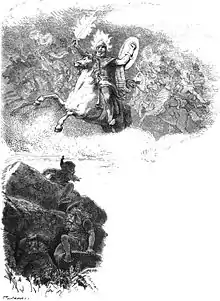Surtur
See also: surtur
English

Surtur mit dem Flammenschwerte (Surtur with the flaming sword), illustration by F. W. Heine for 1882, Wilhelm Wägner, Nordisch-germanische Götter und Helden, based on a plaster frieze designed by Friedrich Wilhelm Engelhard (1859)
Alternative forms
- Surtr (mythological giant)
Proper noun
Surtur
- (Norse mythology) A very powerful jotun (giant) and chief of Muspellheim, described in the Eddas as wielding a flaming (or shining) sword and as battling the gods and killing Freyr during Ragnarok.
- 1839, Samuel Astley Dunham, History of Denmark, Sweden, and Norway, volume 2, page 44:
- (Muspelheim, we suppose, with its numerous fiery inhabitants, and their mighty chief Surtur, the dark, the incomprehensible, the great evil principle, had no beginning; or if it had, the Odinian theologians were unacquainted with it.)
- 1847 [1770], Paul Henri Mallet, Thomas Percy (translator), I. A. Blackwell, Walter Scott (editors), Northern Antiquities, [1756, Paul Henri Mallet, Monuments de la mythologie et de la poesie des Celtes, et particulierement des anciens Scandinaves], page 496,
- We must also remark, that in the Eddaic Poems there is no mention made of Surtur and the Elves of Light existing in Muspellheim previous to the formation of Ymir, […] .
- 2006, Gina Renée Misiroglu, Michael Eury, The Supervillain Book: The Evil Side of Comics and Hollywood, page not identified:
- In Journey into Mystery #97 (1963), writer/editor Stan Lee and artist/cc-plotter Jack Kirby introduced their version of Surtur, one of the greatest enemies of the gods in Norse mythology.
- (astronomy) A moon of Saturn. [Discovered 2006.]
This article is issued from Wiktionary. The text is licensed under Creative Commons - Attribution - Sharealike. Additional terms may apply for the media files.